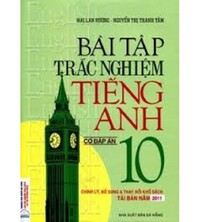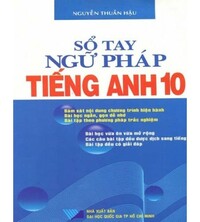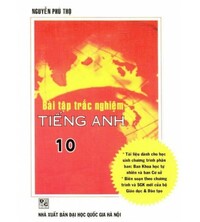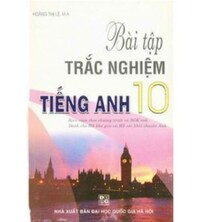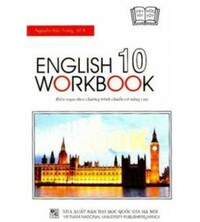4C - Unit 4. Our planet - SBT Tiếng Anh 10 Friends Global
1. Match the words below with definitions 1-10. 2. Label photos A and B with the natural disaster words from exercise 1. 3. Read the Listening Strategy. Then listen to two dialogues and answer the questions. Write the clues which gave you the answers. 4. Listen to four extracts. Match each extract with a natural disaster from exercise 1. 5. Listen again and choose the correct answers.
Bài 1
1. Match the words below with definitions 1-10.
(Nối những từ dưới đây với các định nghĩa 1-10.)

1. A(n) ____________________ is when the ground shakes and buildings collapse.
2. A(n) ____________________ is when hot rocks, fire and steam suddenly come out of the ground.
3. A(n) ____________________ is when water covers the ground in places which are usually dry.
4. A(n) ____________________ is when snow and ice fall quickly down a mountain.
5. A(n) ____________________ is a long period of time without enough food in a region.
6. A(n) ____________________ is a very large and long wave following an earthquake under the ocean.
7. A(n) ____________________ is when there is no rain for a long time.
8. A(n) ____________________ is a fire that spreads quickly through a large area of trees.
9. A(n) ____________________ is when a serious disease spreads to lots of people.
10. A(n) ____________________ is when a large quantity of wet earth suddenly falls down the side of a hill.
Phương pháp giải:
- earthquake: động đất
- volcanic eruption: núi lửa phun trào
- flood: lũ lụt
- avalanche: tuyết lở
- famine: nạn đói
- tsunami: sóng thần
- drought: hạn hán
- forest fire: cháy rừng
- epidemic: đại dịch
- mudslide: lở đất
Lời giải chi tiết:
| 1. earthquake | 2. volcanic eruption | 3. flood | 4. avalanche | 5. famine | 6. tsunami | 7. drought | 8. forest fire | 9. epidemic | 10. mudslide |
1. An earthquake is when the ground shakes and buildings collapse.
(Động đất là khi mặt đất rung chuyển và các tòa nhà sụp đổ.)
2. A volcanic eruption is when hot rocks, fire and steam suddenly come out of the ground.
(Núi lửa phun là khi đá nóng, lửa và hơi nước đột ngột bay ra khỏi mặt đất.)
3. A flood is when water covers the ground in places which are usually dry.
(Lũ lụt là khi nước bao phủ mặt đất ở những nơi thường khô hạn.)
4. An avalanche is when snow and ice fall quickly down a mountain.
(Tuyết lở là khi tuyết và băng rơi nhanh xuống núi.)
5. A famine is a long period of time without enough food in a region.
(Nạn đói là một thời gian dài không có đủ lương thực trong một vùng.)
6. A tsunami is a very large and long wave following an earthquake under the ocean.
(Sóng thần là một cơn sóng rất lớn và dài theo sau một trận động đất dưới đại dương.)
7. A drought is when there is no rain for a long time.
(Hạn hán là khi không có mưa trong một thời gian dài.)
8. A forest fire is a fire that spreads quickly through a large area of trees.
(Cháy rừng là đám cháy lan nhanh qua diện tích cây cối rộng lớn.)
9. An epidemic is when a serious disease spreads to lots of people.
(Đại dịch là khi một căn bệnh nguy hiểm lây lan cho rất nhiều người.)
10. A mudslide is when a large quantity of wet earth suddenly falls down the side of a hill.
(Sạt lở là khi một lượng lớn đất ẩm bất ngờ rơi xuống sườn đồi.)
Bài 2
2. Label photos A and B with the natural disaster words from exercise 1.
(Dán nhãn các bức ảnh A và B với các từ thiên tai trong bài tập 1.)
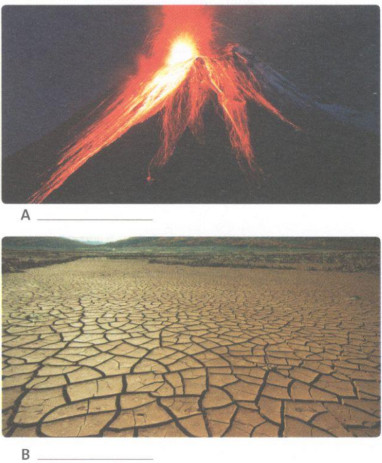
Lời giải chi tiết:
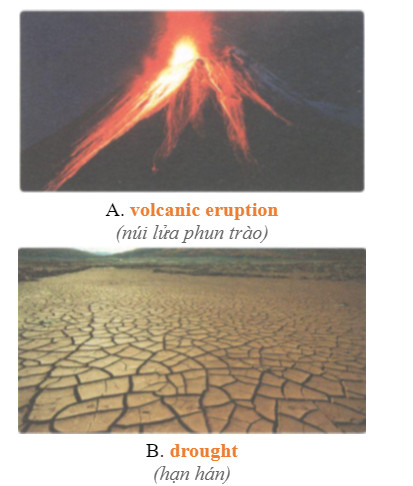
Bài 3
3. Read the Listening Strategy. Then listen to two dialogues and answer the questions. Write the clues which gave you the answers.
(Đọc Chiến lược Nghe. Sau đó nghe hai đoạn hội thoại và trả lời các câu hỏi. Viết các manh mối cho bạn câu trả lời.)
Dialogue 1
1. Where are they? ________________________________________
Clues: _________________________________________________
2. What natural disaster caused the damage? ____________________
Clues: ________________________________________
Dialogue 2
3. What kind of natural disaster are they discussing? ____________________
Clues: ________________________________________
4. What time of day is it? ________________________________________
Clues: ________________________________________
Phương pháp giải:
Bài nghe
1.
Man Hi. Mrs Dennington?
Woman Yes, that’s me. Are you Mr Jones?
M Yes.
W Come in, come in.
M Hmm. I can see straight away there’s a lot of damage here!
W Yes. It was about twenty centimetres deep in my living room!
M So, what would you like me to look at?
W Well, this wall by the kitchen. The water made a few holes near the bottom.
M Oh yes, I see.
W Is it safe?
M Safe? Yes, perfectly safe. You don’t need to worry about that. But it doesn’t look very good!
W So can you fix it?
M Yes, of course. I suppose it’s about two days’ work, so … let’s say £300.
W That’s fine. When can you do it?
2.
Man Did you read this article?
Woman Which one?
M About California. They need rain!
W Really?
M Yes. It says here that in some places it didn’t rain at all during the whole winter! The ground is so dry. Look at this photo.
W That’s amazing.
M What are you having for breakfast?
W Just toast and jam. Do you want a piece?
M Hmm. No, I fancy eggs.
W We haven’t got any eggs.
M I can buy some at the shop next door.
W It isn’t open yet. You need to wait about twenty minutes.
M Forget that, toast and jam is fine.
Bài dịch
1.
Man: Hi. Bà Dennington?
Người phụ nữ: Vâng, đó là tôi. Bạn có phải là ông Jones?
M: Có.
W: Mời vào, vào đi.
M: Hmm. Tôi có thể thấy ngay rằng có rất nhiều thiệt hại ở đây!
W: Có. Nó sâu khoảng 20 cm trong phòng khách của tôi!
M: Vì vậy, bạn muốn tôi xem xét cái gì?
Chà, bức tường này cạnh nhà bếp. Nước tạo thành một vài lỗ ở gần đáy.
M: Ồ vâng, tôi hiểu rồi.
W: Có an toàn không?
M: An toàn? Có, hoàn toàn an toàn. Bạn không cần phải lo lắng về điều đó. Nhưng nó trông không đẹp lắm!
W: Vì vậy, bạn có thể sửa chữa nó?
M: Vâng, tất nhiên. Tôi cho rằng đó là khoảng hai ngày làm việc, vì vậy… giá khoảng £300.
W: Điều đó ổn. Khi nào bạn có thể làm điều đó?
2.
Man: Bạn đã đọc bài viết này?
Người phụ nữ: Cái nào?
M: Về California. Họ cần mưa!
W: Thật không?
M: Có. Ở đây, nó nói rằng ở một số nơi, trời hoàn toàn không mưa trong suốt mùa đông! Mặt đất khô quá. Nhìn vào tấm hình này.
W: Điều đó thật tuyệt vời.
M: Bạn đang ăn sáng gì?
W: Chỉ là bánh mì nướng và mứt. Bạn có muốn một miếng không?
M: Hmm. Không, tôi thích trứng.
W: Chúng tôi không có bất kỳ quả trứng nào.
M: Tôi có thể mua một ít ở cửa hàng bên cạnh.
W: Nó vẫn chưa mở. Bạn cần đợi khoảng hai mươi phút.
M: Quên điều đó đi, bánh mì nướng và mứt cũng được.
Lời giải chi tiết:
Dialogue 1
1. Where are they? They are in Mrs Dennington’s home.
(Họ ở đâu? Họ đang ở nhà của bà Dennington.)
Clues:
“Man Hi. Mrs Dennington?
Woman Yes, that’s me. Are you Mr Jones?
M Yes.
W Come in, come in.”
2. What natural disaster caused the damage? A flood caused the damage.
(Thiên tai gây ra thiệt hại gì? Một trận lũ lụt đã gây ra thiệt hại.)
Clues:
“M Hmm. I can see straight away there’s a lot of damage here!
W Yes. It was about twenty centimetres deep in my living room!”
Dialogue 2
3. What kind of natural disaster are they discussing? They’re discussing a drought.
(Họ đang thảo luận về loại thiên tai nào? Họ đang thảo luận về hạn hán.)
Clues:
“Man Did you read this article?
Woman Which one?
M About California. They need rain!
W Really?
M Yes. It says here that in some places it didn’t rain at all during the whole winter! The ground is so dry.”
4. What time of day is it? It is early morning; they are having breakfast.
(Bây giờ là mấy giờ? Bây giờ là sáng sớm; họ đang ăn sáng.)
Clues:
“M What are you having for breakfast?
M I can buy some at the shop next door.
W It isn’t open yet. You need to wait about twenty minutes.”
Bài 4
4. Listen to four extracts. Match each extract with a natural disaster from exercise 1.
(Nghe bốn trích đoạn. Ghép mỗi đoạn trích với một thảm họa thiên nhiên từ bài tập 1)
1. Natural disaster: ________________________________________
2. Natural disaster: ________________________________________
3. Natural disaster: ________________________________________
4. Natural disaster: ________________________________________
Phương pháp giải:
Bài nghe
1.
Woman Hello.
Man Hi.
W I’m collecting for emergency relief. Can you spare a few coins?
M Actually, I’m in a bit of a hurry. I need to get to the supermarket before it closes.
W Which supermarket? The one in the shopping centre?
M Yes …
W Oh, you’re fine. That’s just round the corner. And it doesn’t close until 8 o’clock. You’ve got ages!
M Right … OK. So, what’s this charity?
W We’re collecting money for food packages to send to Somalia. The situation there is terrible: more than a million people have got nothing to eat. These photos show what’s happening there and how food packages are helping. Maybe if you can spare a minute …
M Yes, yes. It looks terrible. I’ve got some money in my pocket … hold on.
W Anything you can spare …
M Here.
W Thank you!
2.
I was in Japan when it happened, but not near that part of the coast. In fact, I was in Tokyo. I was working there for a few days. While we were having a meeting, somebody heard the news or saw it online. And then everyone was talking about it – in Japanese, of course. I didn’t know what was happening because my Japanese isn’t very good. I had lessons for a while but I found it really difficult! Anyway, I knew something was wrong. I could tell that from their faces and from their voices when they talked. After a few minutes, somebody explained to me in English what was happening. Later I saw it all on TV, how that enormous wave came in and destroyed everything on the coast. It was shocking.
3.
I took a gap year at the end of my university course. I studied medicine, but I didn’t want to be a doctor – my interest was in research. I wanted to be a scientist. Anyway, for my gap year, I went to Cameroon in Central Africa. I got a job helping a medical charity and stayed for the whole year. Basically, I worked as a doctor’s assistant in one of their medical centres. We were really busy because that year, there were a lot of cases of Yellow Fever. It was spreading fast, and people were coming to the medical centre every day with the disease. It took ten months to get it under control. After that, I changed my plan – I didn’t want to be a scientist after all. So I went back to the UK and finished my training to become a hospital doctor. That took two years. Now I’m looking for a job – and I’d love to go back to Africa.
4
Woman Look out of the window. What a great view!
Man Yes, it is. Amazing. Look at those trees – and that mountain in the background.
W It’s a volcano, I think.
M Is it? Yes, maybe. I’m not sure.
W We can ask.
Bell boy Here are your suitcases, madam.
M Thanks very much! Can I ask you a question?
BB Yes, of course.
W Is that a volcano or just a mountain?
BB It’s a volcano: Mount Bagana. But don’t worry – the last time we all had to leave the hotel was five years ago.
M Only five years? So, it’s an active volcano?
BB Yes, active. But it’s quiet now.
W For the moment …
BB Yes, for the moment.
Bài dịch
1.
Người phụ nữ: xin chào
Man: Hi.
W: Tôi đang thu thập để cứu trợ khẩn cấp. Bạn có thể tiết kiệm một vài đồng tiền?
M: Thực ra, tôi hơi vội. Tôi cần đến siêu thị trước khi nó đóng cửa.
W: Siêu thị nào? Một trong những trung tâm mua sắm?
M: Có…
W: Ồ, bạn ổn. Đó chỉ là vòng quanh góc. Và nó sẽ không đóng cửa cho đến 8 giờ. Bạn còn nhiều thời gian!
M: Đúng… OK. Vậy, tổ chức từ thiện này là gì?
W: Chúng tôi đang thu tiền cho các gói thực phẩm để gửi đến Somalia. Tình hình ở đó thật khủng khiếp: hơn một triệu người không có gì để ăn. Những bức ảnh này cho thấy những gì đang xảy ra ở đó và cách các gói thực phẩm giúp ích cho bạn. Có lẽ nếu bạn có thể rảnh một phút…
M: Vâng, vâng. Nó trông thật khủng khiếp. Tôi có một số tiền trong túi của tôi ... chờ xíu.
W: Bất cứ thứ gì bạn có thừa…
M: Đây.
W: Cảm ơn bạn!
2.
Tôi đã ở Nhật Bản khi nó xảy ra, nhưng không gần phần bờ biển đó. Trên thực tế, tôi đã ở Tokyo. Tôi đã làm việc ở đó vài ngày. Trong khi chúng tôi đang họp, ai đó đã nghe tin tức hoặc xem nó trên mạng. Và sau đó mọi người đang nói về nó - tất nhiên là bằng tiếng Nhật. Tôi không biết chuyện gì đang xảy ra vì tiếng Nhật của tôi không tốt lắm. Tôi đã có những bài học trong một thời gian nhưng tôi thấy nó thực sự khó khăn! Dù sao, tôi biết có điều gì đó không ổn. Tôi có thể nhận ra điều đó từ khuôn mặt và giọng nói của họ khi họ nói chuyện. Sau một vài phút, ai đó giải thích cho tôi bằng tiếng Anh chuyện gì đang xảy ra. Sau đó tôi đã xem tất cả trên TV, làm thế nào mà làn sóng khổng lồ tràn vào và phá hủy mọi thứ trên bờ biển. Thật là sốc.
3.
Tôi đã nghỉ học một năm khi kết thúc khóa học đại học của mình. Tôi đã học y khoa, nhưng tôi không muốn trở thành bác sĩ - sở thích của tôi là nghiên cứu. Tôi muốn trở thành một nhà khoa học. Dù sao thì, trong khoảng thời gian ngắn ngủi của mình, tôi đã đến Cameroon ở Trung Phi. Tôi đã nhận được một công việc giúp đỡ một tổ chức từ thiện y tế và ở lại cả năm. Về cơ bản, tôi đã làm việc với tư cách là trợ lý bác sĩ tại một trong những trung tâm y tế của họ. Chúng tôi thực sự rất bận rộn bởi vì năm đó, có rất nhiều ca bệnh sốt vàng. Nó lây lan nhanh chóng và mọi người đến trung tâm y tế mỗi ngày với căn bệnh này. Phải mất mười tháng để kiểm soát nó. Sau đó, tôi thay đổi kế hoạch của mình - tôi không muốn trở thành một nhà khoa học. Vì vậy, tôi đã trở lại Vương quốc Anh và hoàn thành khóa đào tạo để trở thành một bác sĩ bệnh viện. Điều đó đã mất hai năm. Bây giờ tôi đang tìm kiếm một công việc - và tôi muốn trở lại Châu Phi.
4.
Người phụ nữ: Nhìn ra ngoài cửa sổ. Thật là một khung cảnh tuyệt vời!
Người đàn ông: Uhm. Thật kinh ngạc. Nhìn vào những cái cây đó - và ngọn núi đó ở hậu cảnh.
W: Tôi nghĩ đó là một ngọn núi lửa.
M: Thật hả? Có lẽ. Tôi không chắc.
W: Chúng tôi có thể hỏi.
Bell boy: Đây là vali của bà, thưa bà.
M: Cảm ơn rất nhiều! Tôi có thể hỏi bạn một câu hỏi?
BB: Vâng, tất nhiên.
W: Đó là núi lửa hay chỉ là một ngọn núi?
BB: Đó là một ngọn núi lửa: Núi Bagana. Nhưng đừng lo lắng - lần cuối cùng tất cả chúng ta phải rời khách sạn là cách đây 5 năm.
M: Chỉ năm năm? Vì vậy, nó là một ngọn núi lửa đang hoạt động?
BB Vâng, đang hoạt động. Nhưng bây giờ nó yên lặng.
W: Trong lúc này…
BB: Vâng, vào lúc này.
Lời giải chi tiết:
| 1. famine | 2. tsunami | 3. epidemic | 4. volcanic eruption |
Giải thích
1. Natural disaster: famine
(Thiên tai: nạn đói)
Thông tin: “The situation there is terrible: more than a million people have got nothing to eat. These photos show what’s happening there and how food packages are helping.”
2. Natural disaster: tsunami
(Thiên tai: sóng thần)
Thông tin: “Later I saw it all on TV, how that enormous wave came in and destroyed everything on the coast.”
3. Natural disaster: epidemic
(Thiên tai: dịch bệnh)
Thông tin: “We were really busy because that year, there were a lot of cases of Yellow Fever.”
4. Natural disaster: volcanic eruption
(Thiên tai: núi lửa phun trào)
Thông tin: “It’s a volcano: Mount Bagana. But don’t worry – the last time we all had to leave the hotel was five years ago.”
Bài 5
5. Listen again and choose the correct answers.
(Nghe lại và chọn câu trả lời đúng.)
1. The dialogue takes place
a. in a shopping centre.
b. in the street.
c. in a supermarket.
2. The disaster happened while the speaker
a. was on holiday in Japan.
b. was in a business meeting.
c. was in a Japanese lesson.
3. The speaker first went to Africa
a. about three years ago.
b. about two years ago.
c. before university.
4. The man who is giving information about Mount Bagana is
a. a guest at the hotel.
b. an employee at a tourist information office.
c. an employee of the hotel.
Phương pháp giải:
1. The dialogue takes place
(Cuộc đối thoại diễn ra)
a. in a shopping centre.
(trong một trung tâm mua sắm.)
b. in the street.
(trên đường)
c. in a supermarket.
(trong siêu thị)
2. The disaster happened while the speaker
(Thảm họa xảy ra trong khi người nói)
a. was on holiday in Japan.
(đã đi nghỉ ở Nhật Bản.)
b. was in a business meeting.
(đang trong một cuộc họp kinh doanh.)
c. was in a Japanese lesson.
(trong một bài học tiếng Nhật.)
3. The speaker first went to Africa
(Diễn giả lần đầu tiên đến Châu Phi)
a. about three years ago.
(khoảng ba năm trước.)
b. about two years ago.
(khoảng hai năm trước.)
c. before university.
(trước khi học đại học.)
4. The man who is giving information about Mount Bagana is
(Người đàn ông đang cung cấp thông tin về núi Bagana là)
a. a guest at the hotel.
(một khách tại khách sạn.)
b. an employee at a tourist information office.
(một nhân viên tại một văn phòng thông tin du lịch.)
c. an employee of the hotel.
(một nhân viên của khách sạn.)
Lời giải chi tiết:
| 1. b | 2. b | 3. a | 4. c |
Giải thích
1. The dialogue takes place
(Cuộc đối thoại diễn ra)
Chọn b. in the street.
(trên đường)
Thông tin:
W I’m collecting for emergency relief. Can you spare a few coins?
M Actually, I’m in a bit of a hurry. I need to get to the supermarket before it closes.
2. The disaster happened while the speaker
(Thảm họa xảy ra trong khi người nói)
Chọn b. was in a business meeting.
(đang trong một cuộc họp kinh doanh.)
Thông tin: While we were having a meeting, somebody heard the news or saw it online
3. The speaker first went to Africa
(Diễn giả lần đầu tiên đến Châu Phi)
Chọn a. about three years ago.
(khoảng ba năm trước.)
Thông tin: I took a gap year at the end of my university course… I went back to the UK and finished my training to become a hospital doctor. That took two years…
4. The man who is giving information about Mount Bagana is
(Người đàn ông đang cung cấp thông tin về núi Bagana là)
Chọn c. an employee of the hotel.
(một nhân viên của khách sạn.)
Thông tin:
B Here are your suitcases, madam.
M Thanks very much! Can I ask you a question?...
B It’s a volcano: Mount Bagana. But don’t worry – the last time we all had to leave the hotel was five years ago.
Search google: "từ khóa + timdapan.com" Ví dụ: "4C - Unit 4. Our planet - SBT Tiếng Anh 10 Friends Global timdapan.com"
